originally posted at https://canmom.tumblr.com/post/163678...
So we’ve reached whole new levels of anime bullshit.
I neglected to record a couple of comments from @anarcha-catgirlism, who knows considerably more about chess than I do…
yeah actually in chess you’re Supposed to castle early, in a sense it’s a kind of preparation for attacking and not entirely defensive since it both moves the king out of the center and the rook towards it
but in another sense, I guess that’s on-brand for beatrice? There are highly aggressive strats (not really used at the highest level of full time-control play) that involve not taking the time to castle unless absolutely necessary (like Hikaru Nakamura when he plays blitz)
That’s cool to know. I guess Beatrice might play that way, but I’m not sure why she’d assume Battler would? But idk. I get the impression Beatrice isn’t as nearly into actual chess as chess metaphors, so she might not know that nuance…
We return at last to the Ushiromiya adults. This time, there will be no blaming of the servants at least (except perhaps Nanjo). Somehow, they missed the gigantic towers, gigantic giants, and gigantic heavenly spears. Perhaps that fight took place in some alternate reality or pocket dimension or some such, and only the results carried back into the ‘real world’?
I wonder if Kumasawa/ex-Beatrice’s defeat will carry over onto the next game? Perhaps, perhaps not…
Rudolf says “we should count ourselves lucky it’s rain that’s falling and not spears.” in some extra heavy-handed Dramatic Irony.
The siblings have stayed up to devise legal strategies against the 19th person, ‘Beatrice’. That’s going to do them a whole lot of good. They go for breakfast. I wonder where Ronove stashed the bodies? The dining room?
They discover a strange smell and trace it to the boiler room. How very familiar.
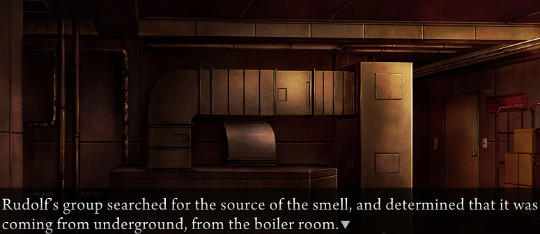
But the boiler room is locked. They also discover the parlour has the Seventh Pentacle of the Sun, and it’s locked as well. A little later, we learn the boiler room also has the Pentacle.
The adults split up to find the servants, check on the children, and find Kinzo to ask what’s going on. The children are of course fine. The servants are of course nowhere to be seen. Rosa, Kyrie, Hideyoshi and Nanjo, meeting in the guest house, conclude it’s some elaborate game organised by Kinzo.
…well, in a way!
Rosa and Kyrie stay with the children, and the others return to the mansion. There, Rudolf has found even more Pentacles. I bet if he counted, he’d find six of them…
…no, actually, there are only five. Assuming no doubling-up, I wonder where the last one is?
They go to get keys. The boiler room key is not in the box. Nor are the keys to any room with a magic circle. So they decide to break a window and enter.
Inside, they find the body of Sayo.
At this point, we cut to meta!Beatrice, badgering meta!Battler. But meta!Battler has already given in to despair.
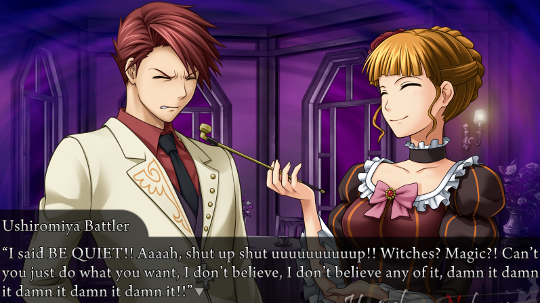
Battler makes it clear he doesn’t care anymore and won’t engage any further with the game. At that moment, there’s a flash of the red barrier symbol. I wonder why…
Battler wanders around in the rose garden, unaffected by the rain. Well that’s interesting - meta!Battler has some physical instantiation, and can move about in the ‘game world’, so is that how he sees it? A place where he stands?
Battler wonders if he’s already accepted witches and magic, just not admitted it. He pokes the ground and decides the towers couldn’t rise out of it without magic.
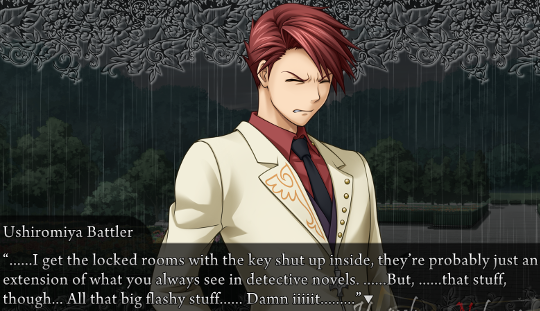
What I don’t really get is why the lightsaber battles, demon goats and magic battles in episode 2 didn’t provoke the same crisis.
Then Battler runs into ex-Beatrice, Predecessor Beatrice, whatever you want to call her… but aren’t you dead?, says Battler.
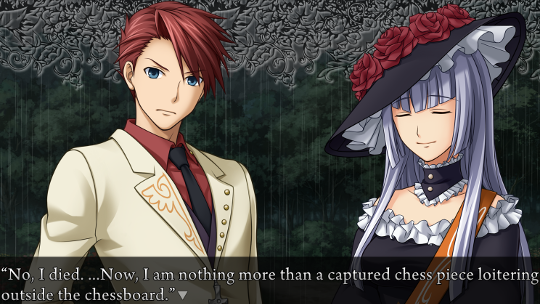
That doesn’t explain a lot…
Battler says, if witches really are real, there’s not really anything he can do against Beatrice, and only ex-Beatrice stands a chance at opposing her. He talks about the absurdity of applying human explanations to the witch battle.
Call it a lie, call it a metaphor?
Ex-Beatrice assures him that, as Beatrice’s opponent, he can always still oppose her (unlike her, a mere game piece). Come off it, says Battler. No, let me tell you a bit about magic, Ex-Beatrice says. She begins with the example of a Japanese rain ceremony, where a large fire is built. Battler suggests it creates a thermal, which in turn creates clouds - an ‘accepted scientific phenomenon’. I think confirmation bias might be another factor. Ex-Beatrice suggests the magical account - offerings to the gods. Battler immediately starts on a spiel about how most superstitions can be explained by science.
Ex-Beatrice brings up the phlogiston theory of fire. Battler at least knows to cite Lavoisier and call it an oxidation reaction. Ex-Beatrice offers the caloric theory of heat transfer. Battler says heat is energy, ‘not a substance’. OK, Battler, that’s not really an adequate explanation of how ‘energy’ differs from ‘caloric’, but that is probably beside ex-Beatrice’s point.
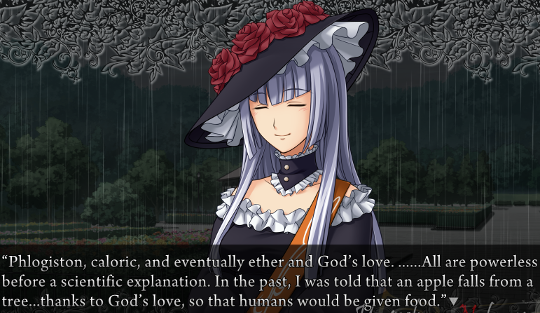
I think I see where she’s going with this. That Battler can’t explain the phenomena he saw with known science doesn’t mean he can’t develop a scientific approach to the ‘magic’ he sees. Rather than treat ‘magic’ as a stop button, he could start attempting to theorise ‘magic’, turn it into something other than ‘magic’.
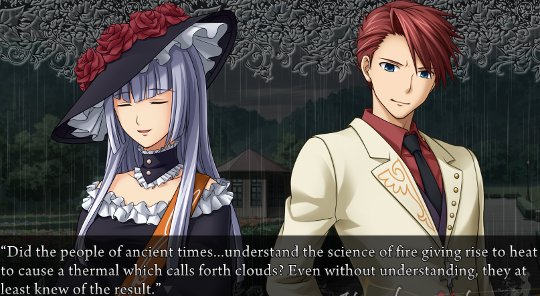
Mmm, looks like it. This really is an epistemology course disguised as a fantasy detective visual novel, isn’t it?
Ex-Beatrice goes on to argue that many everyday phenomena we don’t know the full explanation for, but we don’t call magic. As a former physics student, I can very emphatically underline this.
Now she illustrates what a bad explanation looks like.
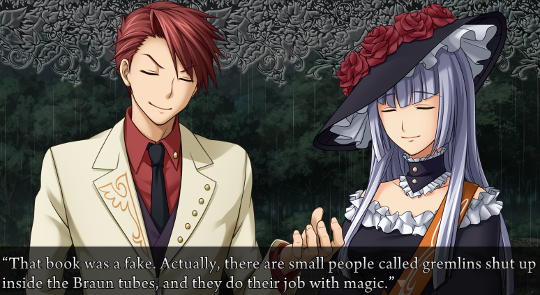
Battler’s like no way. But, ex-Beatrice says, we can’t disprove it without taking apart a Braun tube. This is not a devil’s proof, which she has harsh words for.
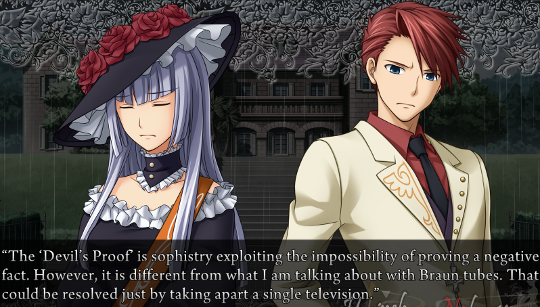
I expect she’s angling towards parsimony, falsifiability, and other criteria for a good explanation?
Hmm, maybe not actually. It seems to be about entertaining multiple hypotheses, and experimentally distinguishing them?
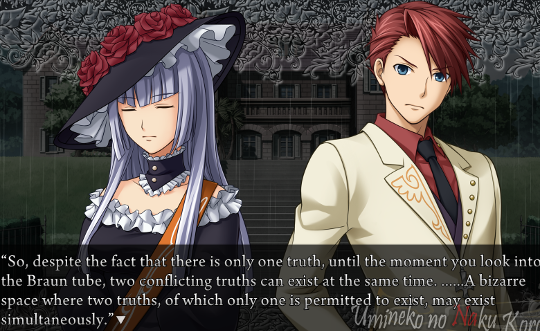
This immediately segues into Schrödinger’s cat, though completely unrelated to its original context.
Ex-Beatrice says Rokkenjima is currently impartial between the magic and scientific worlds. She compares it to a courtroom.
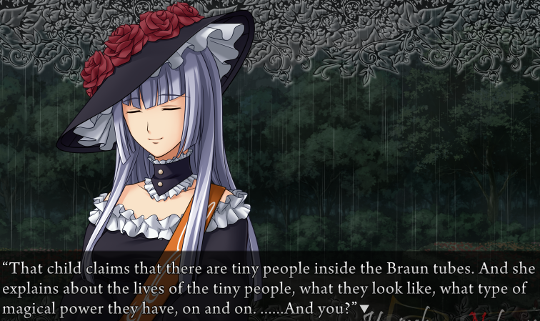
Battler says he would study Braun tubes and explain how they were constructed.
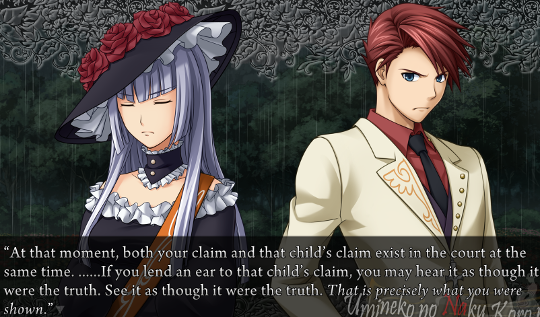
So this seems to be a roundabout way of declaring the narration is not necessarily to be trusted, and Battler can offer an alternative narrative, through a certain sort of dialetheism. (I think the dialetheism is unnecessary, but it seems to perk Battler back up, so…)
Battler asks what the empirical test could determine between their competing hypotheses. Ex-Beatrice says that’s what the game is supposed to determine. She says she will offer advice at other times.
Battler asks her for a name. She no longer has Beatrice, so she takes the name Virgilia after the poet who is Dante’s guide through Hell and Purgatory in the Divine Comedy, before passing him off to Beatrice at the top of Mount Purgatory.
Battler returns to the game. Beatrice taunts him, asking how he’ll explain the magic battle.
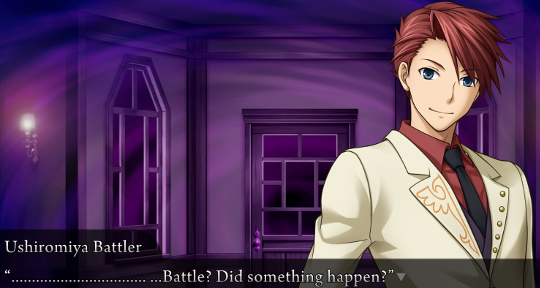
Oh, that’s some good deadpan.
Battler says the lack of physical evidence is reason to reject the claim that a magical battle took place involving towers and so forth. (He doesn’t say it, but now Beatrice has no choice: she can’t simply declare that it did in red text without destroying the basis of the game.)
Beatrice claims that the fight took place inside a ‘barrier’. Battler says, parsing the Braun tube metaphor, there’s no evidence to support that claim, and he has a counterclaim that no magic battle took place.
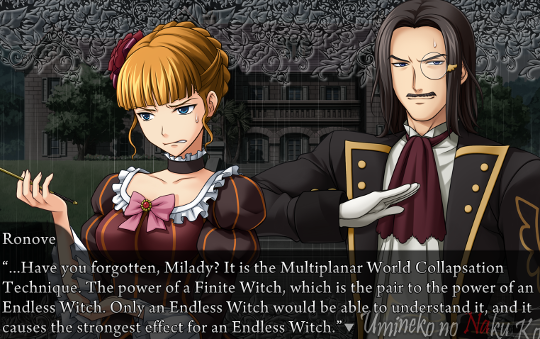
This is ridiculous. I thought my provisional mundane Beatrice hypothesis was a silly name, but this takes the cake.
There’s another inappropriate reference to Schrödinger’s cat, which has nothing to do with whether the Copenhagen interpretation leads to a conceptually ridiculous result or not.
Next chapter: skirmish.
Comments